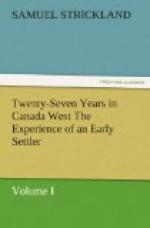Only the first three concessions of this township were settled at this time, the remainder of the land being generally in the hands of absentee proprietors. I am happy to say, the absentee tax has had the effect of throwing vast quantities of these lands into the market.
This township, like Whitby, is now well settled, and though not generally equal in regard to soil, is still considered a good township. Bowmanville is the principal town, containing about twelve hundred inhabitants. In 1825 it only boasted a grist-mill, saw-mill, a store, and half-a-dozen houses. I mention this, merely to show how much the country has improved in a few years. This is not an isolated fact it applies to nearly all Canada West.
My intention was, to stay with my friends till the ensuing spring, and to get a little insight into Canadian farming, clearing land, &c., that I might have some experience before commencing operations on my own account.
The situation of my friend’s house was close to the Toronto road, partly built of logs and framework: it had been designed by the former Yankee proprietor, and could certainly boast of no architectural beauties. We lived about a mile and a half from the lake shore, and I took advantage of my vicinity to the water to bathe daily. I found great refreshment in this, for the weather was very hot and dry. The drought lasted for some time, and among its consequences, I may mention the prevalence of extensive fires.* Several broke out in our neighbourhood, and, at last, the mischief reached our own farm. It destroyed several thousand rails, and spread over forty or fifty acres of meadow land. We ultimately stopped its further progress in the clearing, by ploughing furrows round the fire and a thunder-shower in the evening completed its extinction. Fire seldom runs in the woods on good land, and where the timber is chiefly deciduous, but on sandy, pine, or hemlock lands, or where evergreens chiefly prevail.
[* Fires in Canada are of frequent occurrence, and are generally caused by the burning of brush-wood or log-heaps by the settlers. In dry weather, with a brisk wind, the fire is apt to run on the surface of the ground in the bush, where the dry leaves are thickest. In clearing the land a good deal of brush-wood and tops of trees are thrown into the edge of the woods. It follows, as a matter of course, that the greatest danger to be apprehended is the burning the boundary-fences of farms. I have heard it asserted that these fires are sometimes caused by spontaneous combustion, which I consider altogether a fallacy.]




